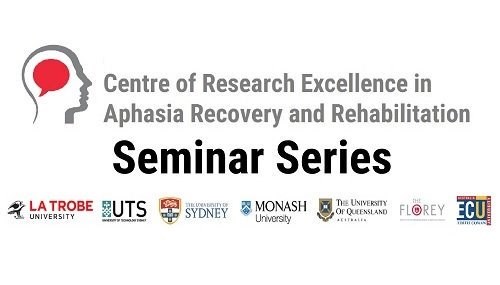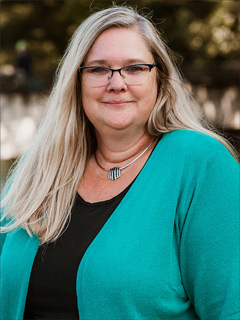Aphasia CRE seminar: Co-constructing stories
Supporting people with aphasia in meaning-making and moving forward

Wednesday 20 March 2024
- Melbourne, Sydney – 9 am (AEDT)
- Brisbane – 8 am (AEST)
- Perth – 6 am (AWST)
- London – 10 pm, 19 March (GMT)
- Boston – 6 pm, 19 March (EST)
Presented by Dr Katie A. Strong, Central Michigan University, USA
Life changes like stroke and aphasia threaten our sense of identity, and place people with aphasia at risk for mental health issues. This seminar will explore how clinicians can use stories to support people with aphasia in navigating who they are and will be.
Literature linking identity and story will be reviewed. Evidence-based methods for story co-construction will be shared.

Dr Katie Strong leads the Strong Story Lab at Central Michigan University. Her research uses qualitative methods to explore how speech-language pathologists can support people with aphasia rebuild their identity and improve their quality of life by co-constructing stories about who they are and will be.
Previous seminars are available to view online
Seminar recordings are available on the Aphasia CRE YouTube channel.
See the most recent seminars:
- Inner speech in aphasia: considerations for measurement, and implications for understanding daily life with aphasia, the language system, and response to therapy, presented by Dr Brielle C. Stark, Indiana University Bloomington, USA.
- Clinical effectiveness of the Queen Square Intensive Comprehensive Aphasia Service for Patients with Post-Stroke Aphasia, presented by Prof. Jenny Crinion and Prof. Alex Leff, University College London.
- Applying the clinical “crystal ball” to aphasia treatment outcome, presented by Prof. Julius Fridriksson, University of South Carolina, USA.
- Everyday communication in aphasia rehabilitation, presented by Dr Willemijn Doedens, Radboud University, Netherlands.
- Accessible healthcare for people with aphasia through trained staff, presented by Dr Jytte Isaksen, University of Southern Denmark.
- Supporting wellbeing through peer-befriending: results from the SUPERB feasibility trial, presented by Prof. Katerina Hilari, City University London.
- Understanding and predicting outcomes in aphasia rehabilitation, presented by Prof. Swathi Kiran, Boston University, USA.
- Preservation of singing skills and rehabilitative efficacy of music in stroke and aphasia, presented by Dr Teppo Särkämö, University of Helsinki, Finland.
- Living Stroke Guidelines: how does this support best practice care to people with aphasia? Presented by Kelvin Hill, Stroke Foundation.
- The three variants of primary progressive aphasia: what are they and what helps? Presented by Dr Anna Volkmer, University College London.
- Reporting on LUNA – a novel discourse intervention for people with mild to moderate aphasia, presented by Dr Madeline Cruice and Dr Lucy Dipper, City, University of London


